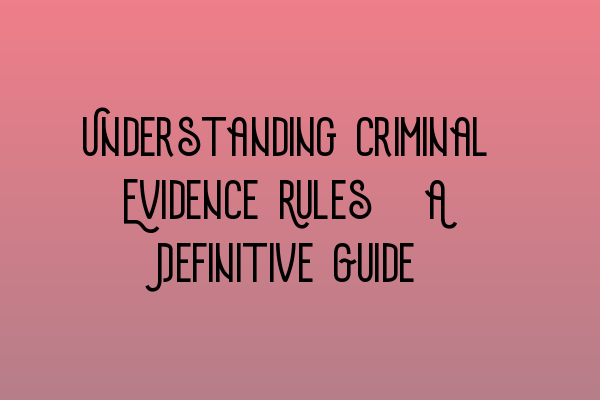Understanding Criminal Evidence Rules: A Definitive Guide
When it comes to criminal law cases, understanding the rules surrounding the admission of evidence is crucial. Criminal evidence can make or break a case, and as a defendant or legal professional, it is essential to have a comprehensive understanding of how evidence is handled in the criminal justice system.
In this definitive guide, we will explore the intricate details of criminal evidence rules, arming you with the knowledge necessary to navigate the complexities of the legal system effectively.
The Importance of Criminal Evidence
In criminal cases, evidence plays a pivotal role in establishing the guilt or innocence of the accused. The law restricts the types of evidence that can be presented in court and sets forth rules regarding admissibility and exclusion to ensure fair and just trials.
Understanding these rules is crucial as improper handling of evidence can lead to its exclusion, which may severely impact the outcome of a case.
Types of Criminal Evidence
Before delving into the rules, it’s important to familiarize yourself with the different types of criminal evidence that may be presented in court:
- Documentary Evidence: This includes any written or recorded material presented as evidence, such as contracts, emails, or police reports.
- Testimonial Evidence: Testimony from witnesses or experts who provide their account or analysis of a situation or event.
- Physical Evidence: Tangible items, such as weapons, fingerprints, or DNA samples, that can connect a person to a crime.
- Exculpatory Evidence: Evidence that may prove the innocence of the accused or cast doubt on their guilt.
Rules of Admissibility
Now, let’s dive into the rules governing the admissibility of evidence in criminal cases:
- Relevance: For evidence to be admissible, it must be relevant to the case at hand. This means that it must have some logical connection to the facts in dispute.
- Hearsay: Hearsay refers to a statement made outside of court that is offered as evidence to prove the truth of the matter asserted. In general, hearsay is not admissible unless it falls within a recognized exception.
- Character Evidence: Evidence regarding a person’s character or reputation is generally not admissible unless it is directly relevant to the case, such as in cases of self-defense or defamation.
- Privileged Communications: Certain communications, such as those between an attorney and their client or a doctor and their patient, are protected by privilege and generally cannot be used as evidence.
- Unfair Prejudice: Evidence that is deemed excessively prejudicial, such as evidence of a defendant’s prior crimes, may be excluded if its probative value is outweighed by its potential to unfairly influence the jury.
These are just a few examples of the rules that govern the admissibility of evidence. It is important to consult with a qualified criminal defense solicitor to fully understand the specific rules relevant to your case.
The Role of Expert Witnesses
Expert witnesses play a crucial role in criminal cases, providing specialized knowledge and opinions to help the court understand complex scientific, technical, or medical evidence.
To learn more about the importance of expert witnesses and their role in criminal cases, you can read our related article on Legal Representation for Delaware LLCs in the UK: Expert Advice.
Challenges and Strategies
Navigating criminal evidence rules can be challenging, as the admissibility of evidence can be a contentious issue in court. It requires a solid understanding of the law, strategic thinking, and an awareness of potential challenges that may arise.
If you are interested in learning more about legal challenges in criminal cases and strategies to overcome them, be sure to check out our related article on Legal Challenges for UK Businesses in the U.S.: Strategies for Overcoming Hurdles.
Conclusion
Understanding the rules surrounding criminal evidence is vital for anyone involved in the criminal justice system. Being knowledgeable about the types of evidence, rules of admissibility, and the role of expert witnesses can greatly enhance your ability to effectively defend your case or represent your clients.
To gain a comprehensive understanding of the British legal system, including criminal law, we recommend reading our in-depth analysis on UK Criminal Law: An In-Depth Analysis of the British Legal System.
For further guidance on legal challenges and strategies in the United States, specifically for UK businesses, check out our article on Legal Challenges for UK Businesses in the U.S.: Strategies for Overcoming Hurdles.
